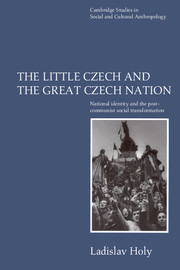 The Little Czech and the Great Czech Nation
The Little Czech and the Great Czech Nation Published online by Cambridge University Press: 05 June 2012
Whether people behave in accordance with their traditions may be questionable, but in the Czech view the existence of the traditions themselves is beyond doubt. Individual Czechs or even most Czechs may be autocratic and intolerant of the opinions of others, but Czechs as a nation are inherently democratic; many Czechs may have no more than the compulsory education and not even a modicum of manners, but the Czech nation is well educated and highly cultured. National traditions make it possible to find the behaviour of most members of the nation wanting at specific times without such behaviour's adversely affecting the positive image of the nation as a whole. Thus, for example, the collaboration of a considerable number of Czechs with the German occupation during World War II and the compliance of most Czechs with the communist system have not shattered the democratic tradition of the Czech nation.
All this seems to suggest that a nation can be a nation only when it has traditions. This is something that has probably always been intuitively felt. The contemporary Czech philosopher Jaroslava Pešková expressed this feeling when she said that ‘a nation without a tradition loses the meaning of its existence’ (1988: 118).
Anderson argues that a nation ‘is an imagined political community – and imagined as both inherently limited and sovereign’ (1983: 6) and that it was the emergence of press capitalism that made this imagination possible.
To save this book to your Kindle, first ensure [email protected] is added to your Approved Personal Document E-mail List under your Personal Document Settings on the Manage Your Content and Devices page of your Amazon account. Then enter the ‘name’ part of your Kindle email address below. Find out more about saving to your Kindle.
Note you can select to save to either the @free.kindle.com or @kindle.com variations. ‘@free.kindle.com’ emails are free but can only be saved to your device when it is connected to wi-fi. ‘@kindle.com’ emails can be delivered even when you are not connected to wi-fi, but note that service fees apply.
Find out more about the Kindle Personal Document Service.
To save content items to your account, please confirm that you agree to abide by our usage policies. If this is the first time you use this feature, you will be asked to authorise Cambridge Core to connect with your account. Find out more about saving content to Dropbox.
To save content items to your account, please confirm that you agree to abide by our usage policies. If this is the first time you use this feature, you will be asked to authorise Cambridge Core to connect with your account. Find out more about saving content to Google Drive.